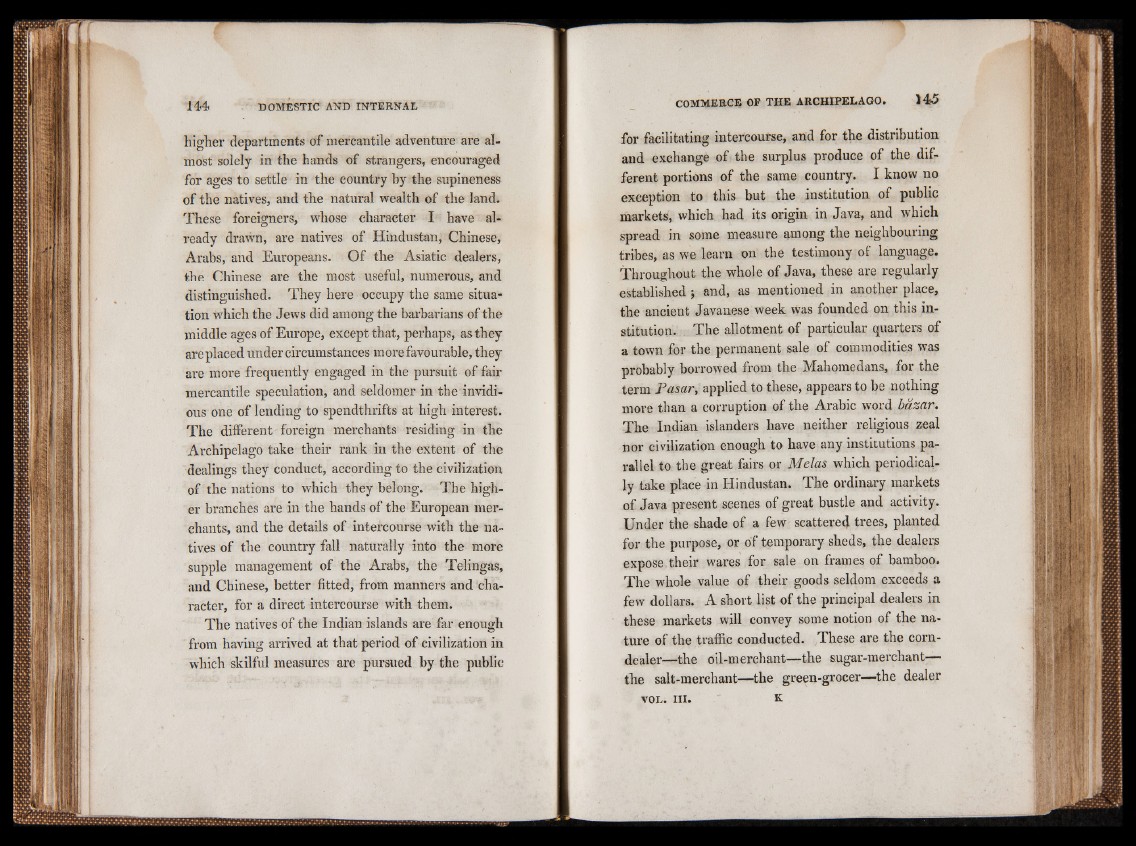
higher departments of mercantile adventure are almost
solely in the hands of strangers, encouraged
for ages to settle in the country by the supineness
of the natives, and the natural wealth of the land.
These foreigners, whose character I have already
drawn, are natives of Hindustan, Chinese,
Arabs, and Europeans. Of the Asiatic dealers,
the Chinese are the most useful, numerous, and
distinguished. They here occupy the same situation
which the Jews did among the barbarians of the
middle ages of Europe, except that, perhaps, as they
are placed under circumstances more favourable, they
are more frequently engaged in the pursuit of fair
mercantile speculation, and seldomer in the invidious
one of lending to spendthrifts at high interest.
The different foreign merchants residing in the
Archipelago take their rank in the extent of the
dealings they conduct, according to the civilization
of the nations to which they belong. The higher
branches are in the hands of the European merchants,
and the details of intercourse with the natives
of the country fall naturally into the more
supple management of the Arabs, the Telingas,
and Chinese, better fitted, from manners and character,
for a direct intercourse with them.
The natives of the Indian islands are far enough
from having arrived at that period of civilization in
which skilful measures are pursued by the public
for facilitating intercourse, and for the distribution
and exchange of the surplus produce of the different
portions of the same country. I know no
exception to this but the institution of public
markets, which had its origin in Java, and which
spread in some measure among the neighbouring
tribes, as we. learn on the testimony of language.
Throughout the whole of Java, these are regularly
established; and, as mentioned in another place,
the ancient Javanese week was founded on this institution.
The allotment of particular quarters of
a town for the permanent sale of commodities was
probably borrowed from the Mahomedans, for the
term Pasar, applied to these, appears to be nothing
more than a corruption of the Arabic word bazar.
The Indian islanders have neither religious zeal
nor civilization enough to have any institutions parallel
to the great fairs or Melas which periodically
take place in Hindustan. The ordinary markets
of Java present scenes of great bustle and activity.
Under the shade of a few scattered trees, planted
for the purpose, or of temporary sheds, the dealers
expose, their wares for sale on frames of bamboo.
The whole value of their goods seldom exceeds a
few dollars. A short list of the principal dealers in
these markets will convey some notion of the nature
of the traffic conducted. These are the corn-
dealer—the oil-merchant—the sugar-merchant—
the salt-merchant—the green-grocer—the dealer
VOL. III. k